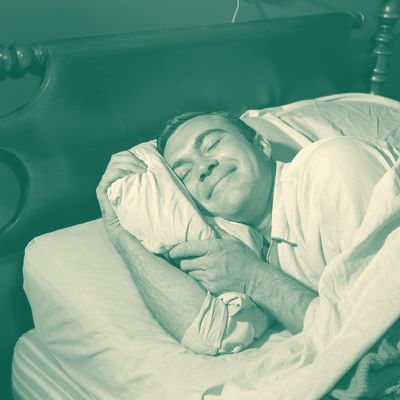
It sounds just a little bit like a plot cooked up by a sci-fi villain: You fall asleep hooked up to some brain-scanning machine, and snooze the night away as a roomful of scientists peer into your subconscious. Come morning, they know exactly what you dreamed about.
Well, a study recently published in the journal Nature Neuroscience and highlighted by NPR isn’t exactly that — but it’s still on the spookier side, as far as dream studies go.
The study authors recruited 32 subjects and monitored their brain activity as they slept through the night, waking them up at regular intervals to ask about their dreams. (Everyone dreams, even if they don’t remember doing so; it’s just that dreams are more difficult to recall if you keep on sleeping after they happen.) Whenever a study subject was able to report with certainty that they had been dreaming right before being woken, the authors went back and reviewed the patterns recorded with an electroencephalograph (EEG) test, which measures electrical activity in the brain.
After looking through enough of the EEG readouts, the researchers were able to zoom in on what they called a “cortical hot zone” — a place toward the back of the brain where low-frequency activity slowed down and high-frequency activity picked up during the periods of dreaming. Eventually, they nailed down the pattern enough to look at an EEG and know, with 90 percent certainty, whether or not it was recorded during a dream.
And then it got a little more specific. NPR explained:
In a smaller study, the researchers looked at activity in areas of the brain that respond to specific stimuli, like seeing a face, hearing speech or perceiving movement. Activity in these areas during dreams offered hints at what the person had been dreaming about.
For example, when someone’s dream included a face, there was activity in a part of the brain used to recognize faces. And when a dream involved a sense of movement, there was activity in an area that is involved in the perception of movement.
In other words, while the researchers couldn’t tell exactly what their subjects were dreaming about, they could get a rough sense. As Harvard psychiatry professor Robert Stickgold — who wasn’t part of the study — told NPR, the technique the authors used isn’t a foolproof one. “What they’re really measuring is what’s happening before you wake someone up and the person remembers having been dreaming,” he said. It’s nonetheless a cool, and unsettling, window into a still-mysterious phenomenon.




